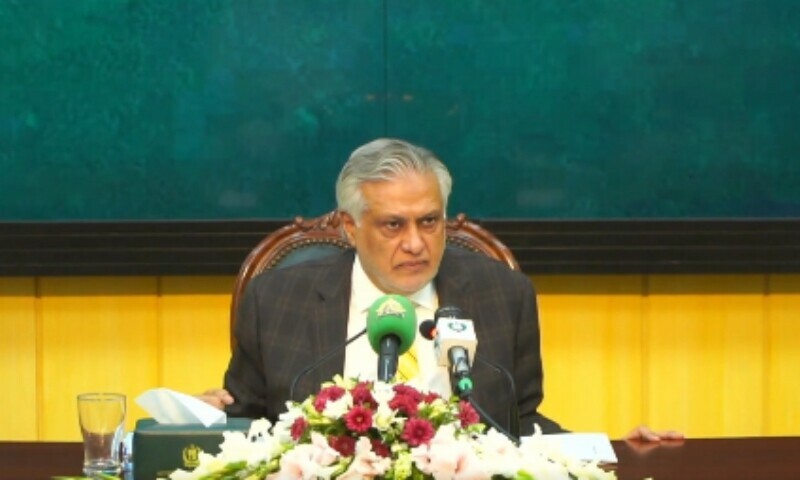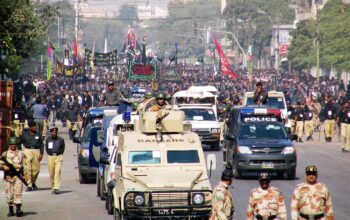By Staff Reporter
ISLAMABAD: Pakistan’s Foreign Minister Ishaq Dar on Friday ruled out joining the Abraham Accords, insisting that recognising Israel would betray Islamabad’s long-standing support for a two-state solution to the Palestinian conflict.
The statement rebuffs US efforts to expand the accords, which have normalised ties between Israel and several Arab states since 2020.
At a news conference in the Foreign Office, Dar, also deputy prime minister, doubled down on Pakistan’s position. “We are not ready to recognise Israel until the two-state solution to the Palestine conflict is accepted,” he said. “There is no change in our stated policy on the Palestine issue.”
Dar’s remarks were a direct response to recent comments by US Special Envoy for the Middle East Steve Witkoff, who suggested that additional countries, not previously considered, were poised to join the Abraham Accords.
Witkoff made the statement following a White House lunch attended by President Donald Trump and Pakistan’s Army Chief Field Marshal Asim Munir, an event that highlighted the ongoing diplomatic engagement between Washington and Islamabad.
Dar stressed that participation in the accords would contradict Pakistan’s call for a Palestinian state with Jerusalem as its capital, based on pre-1967 borders, a cornerstone of its foreign policy for seven decades.
“Let it be clear to everyone that our seven-decades-long policy remains unchanged,” he said, reinforcing a position that has been a bedrock of Pakistani foreign policy since the country’s founding.
The foreign minister also addressed mounting criticism over Pakistan’s decision to nominate President Trump for the Nobel Peace Prize, a move that has sparked controversy within the country.
Dar defended the nomination, explaining that it was a joint decision by Pakistan’s civilian and military leadership, rooted in Trump’s efforts to reduce tensions between India and Pakistan and his public statements on the Kashmir dispute.
“The decision to nominate President Trump for the Nobel Peace Prize was in the context of his role in the India-Pakistan conflict and his statements on the Kashmir issue,” Dar said. “It was a collective decision by the civil-military leadership. I signed the letter on June 11, days before the Iran-Israel war began. The prime minister’s approval was obviously part of the process.”
Dar pointed to Trump’s social media activity, noting that the president “tweeted 15 or 16 times” about his role in facilitating the May 10 ceasefire between Pakistan and India, an assertion that has rankled officials in New Delhi.
He also referenced Prime Minister Shehbaz Sharif’s description of Trump as “a man of peace” during a June 4 event at the US Embassy, a remark that has fueled further debate domestically.
The nomination, submitted before the outbreak of the Israel-Iran conflict, has divided opinion in Pakistan, with critics questioning whether Trump’s actions merit such recognition and others viewing it as a pragmatic diplomatic gesture.
Dar also took aim at Indian officials’ claims that Pakistan had sought a ceasefire, dismissing them as baseless and reaffirming Islamabad’s willingness to engage in dialogue, but only on equal terms.
“We didn’t ask anyone for a ceasefire, nor would we ask anyone for dialogue,” he said. “If India wants talks, we are ready. But we are a dignified nation, we won’t beg. Pakistan is prepared to talk on all outstanding issues, including Kashmir and terrorism, at any venue, but in a respectful manner. The ball is in their court. It takes two to tango.”
His comments directly challenge New Delhi’s narrative and signal Pakistan’s determination to maintain its dignity while keeping the door open for negotiations. The mention of Kashmir and terrorism as key topics reflects the deep-seated issues that continue to strain relations between the two nuclear-armed neighbors.
Dar also said his country did not turn a blind eye to US airstrikes on Iranian nuclear facilities earlier this month, adding that close relations with a country do not justify silence in the face of wrongdoing.
Despite a recent revival in bilateral ties with Washington, Pakistan formally condemned the US strikes in a statement, calling them a violation of international law and affirming Iran’s right to self-defense under the UN Charter.
“Just because relations are good with a country doesn’t mean you should consider something wrong to be right,” he said.
“As you witnessed, we didn’t hesitate or delay,” he continued. “I spoke with the foreign secretary, gave a task to the spokesperson and we exchanged draft statements. It’s now a part of the historic record: we criticized the attack, and we did it on record.”
A 12-day conflict between Iran and Israel erupted after Israeli strikes targeted Iranian nuclear and military sites, prompting retaliation from Tehran. The war began while the administration in Tehran was holding nuclear negotiations with the US that later joined the fray, launching its own strikes on three Iranian nuclear facilities.
While Washington said the attacks had set back Iran’s nuclear program by years, there was international concern over a wider regional war.
Copyright © 2021 Independent Pakistan | All rights reserved




